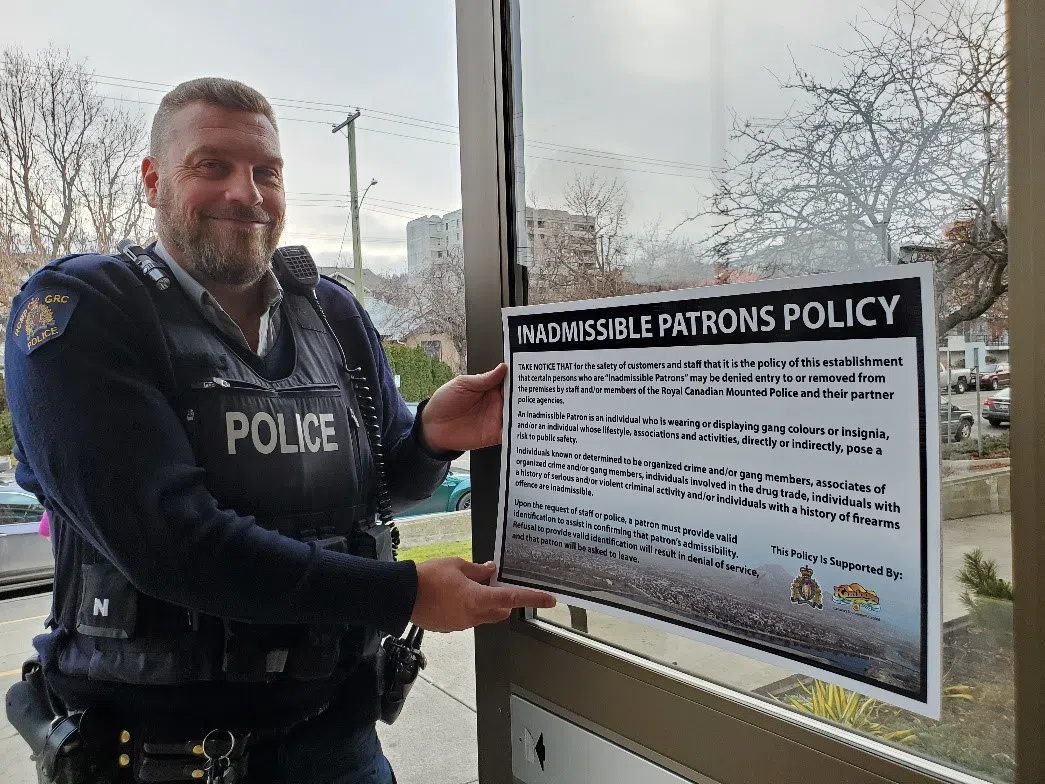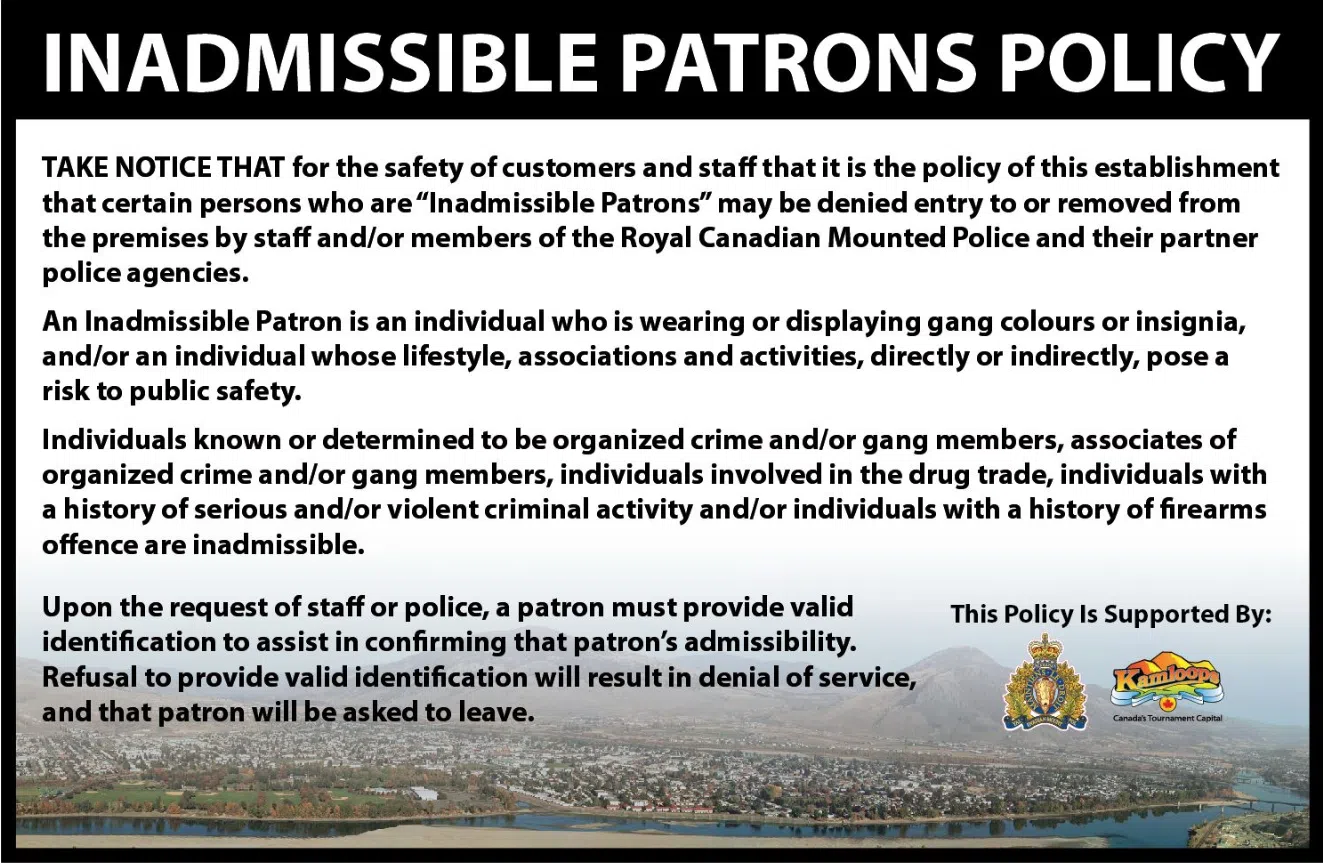
A Kamloops RCMP officer displaying the Inadmissible Patrons Policy sign. (Photo via Kamloops RCMP)
Kamloops RCMP is relaunching its Inadmissible Patrons Policy this Friday which they say will enable to police officers to remove “unwanted patrons” from participating establishments.
Police say the program – which first launched in 2018 – will see signs set up near the entrances of pubs and restaurants starting Dec. 22.
“This policy is intended to send a strong message to criminals in Kamloops – you’re not welcome here and if we recognize that you are in one of our partner establishments, you will be told to leave,” Kamloops RCMP Superintendent Jeff Pelley said in a statement.
“An inadmissible patron is someone wearing gang colours or insignia, or is known to be involved in organized crime or other criminality including firearms offences, sexual and violent assaults. Individuals who participate in a lifestyle that places themselves and others at risk – directly or indirectly – jeopardize public safety in a manner that is inexcusable and unwelcomed in Kamloops.”
The program was put on hold during the COVID-19 pandemic due to social distance restrictions and a variety of other challenges, according to police.
As part of the policy, police say they’ll be able to deny entry or remove people who fit the definition of inadmissible as listed on the sign. Officers will also be able to ask people to show their identification, failing which they will be denied service and asked to leave.
“This program in particular is intended to increase the safety to patrons, the staff and the public by reducing the threat of that collateral violence caused by those individuals,” Kamloops RCMP spokesperson Cpl. Crystal Evelyn told Radio NL. “You don’t have to worry about who is sitting at the next table especially if you start to see insignia or gang colours.”
“Instead of a business having to maybe have that awkward moment where they’re calling us, we can proactively go in there and look for people.”

The Inadmissible Patrons Policy in Kamloops. (Photo via Kamloops RCMP)
While police said there is no risk of profiling people, the BC Civil Liberties Association said it has some concerns as people “generally don’t have to give their ID to police.”
“They have mentioned people wearing or displaying gang colours or insignia will be focused on. They also mention individuals whose lifestyle associations and activities pose a risk to public safety, and that’s is very ambiguous criteria that is going to be applied,” BC CLA Staff Counsel Meghan McDermott told Radio NL in 2018, when the program was first launched.
“We’d be worried about the lack of clear rules about who is actually going to be caught up in that, who will be focused on, and who will be profiled as being a risk to public safety.”
McDermott also said it can be tough for people who wrongly caught up in the program to clear their names off a police database, which she said could cause problems if they’re needing to get a criminal record check for a job or a volunteer opportunity.
“We all know from going out, sometimes you run into people that you may not know very well,” McDermott added.
“If one of those people happens to be on a list, there’s obviously a concern that innocent people…their records in the police database are then going to include a note about their affiliation with this gang member or other nefarious person or individual.”
Plans to revive program began in November
Mounties say plans to revive the program began earlier last month, when the Kamloops Crime Prevention and Reduction Units partnered with the two business improvement associations, who began contacting local establishments.
“This initiative ensures a safer and more welcoming environment throughout our neighbourhood,” Kamloops Central BIA Executive Director, Howie Reimer, said in a statement.
“The IPP, with its focus on deterring criminal activity and promoting public safety, aligns with our mission to foster a vibrant and secure downtown core. We believe that this program will not only help protect our patrons but also enhance the overall business climate, encouraging more people to visit and enjoy what downtown has to offer.”
“This is an example of how the RCMP and businesses collaborate to create actions which result in safer communities for all,” added Jeremy Heighton, the Executive Director of the North Shore Business Improvement Association.
“We are proud to stand alongside our response organization and support their efforts on our behalf.”
Proponents say the program intends to increase safety to patrons, staff, and the public by “reducing the threat of collateral violence caused by individuals who meet the parameters of being designated inadmissible.”
“It also helps eliminate the awkward interaction between the patron and the establishment’s staff, for fear of associated intimidation, violence, and harassment,” the RCMP said.
In announcing the revival of the program, Mounties say it will compliment other policies and regulations – like the Good Neighbour Agreement – which are already present in the City.
“Community safety is a shared priority for Council and City staff, and we look forward to working alongside our partners at the RCMP to further this important initiative and help residents, visitors, and staff feel safer in these establishments,” Ken Uzeloc, the City’s Director of Protective Services Department said in a statement.















